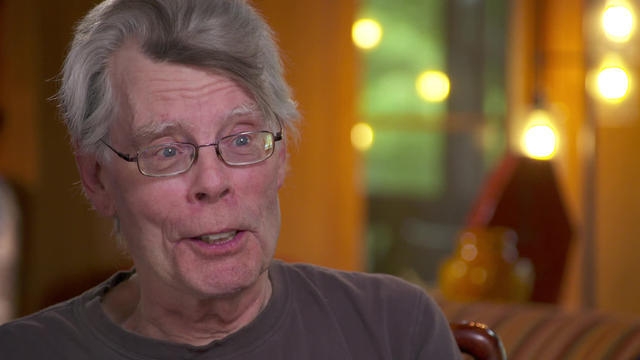
In Bangor, Maine, mythical lumberjack Paul Bunyon still commands pride of place – but the top tourist attraction is a stately old Victorian guarded by a wrought-iron fence, adorned with bats.
Ruth Whitted and her family drove all the way from Ohio to see it. “We’re all big fans of Stephen King,” she said. “Once you start, you can’t put the book down.”
Glen Ahlers rode up from New York City to pay homage: “Certainly, the way that he paints Bangor in ‘It,’ it’s a masterpiece.’
In the chilling 1980s bestseller “It,” evil taking the form of a clown, Pennywise, is stalking children.
James Tinker said, “At the end of my street was the storm drain where Georgie meets Pennywise. Scared the wits out of me!”
But today, Tinker guides tours of “King’s World.” “He writes in a way where we can understand the characters, understand that we’re like them, and also can see how things can go in a pretty terrible way sometimes,” he said.
This month on Apple TV, Julianne Moore stars in “Lisey’s Story,” about the grieving widow of a popular author of horror fiction.
King wrote the teleplay based on his 2006 bestseller, a world of dark imagination – sometimes beautiful, often terrifying – and “Sunday Morning” anchor Jane Pauley’s introduction to King’s world.
“I scare easily; I don’t relish it,” Pauley told King.
“You’re not a roller coaster girl?”
“No, Sir.”
“Me, either.”
“You’re not?”
“No, no,” said King. “You see, the thing is, I build the roller coasters. That doesn’t mean I have to ride on ’em!”
And he’s built a lot of ’em! Leaving aside the stories, movie adaptations and teleplays, he’s written some 80 novels – including two this year: “Later,” and “Billy Summers.”
Still, at 73, King claims the words don’t come like they used to.
“You force yourself to get going, one sentence, two sentences, three. And little by little, you enter that other world,” he said.
Pauley asked, “Do you write every day?”
“Yeah.”
“Which includes today?”
“Yeah.”
“You wrote today?”
“Yep!”
“I’m glad we didn’t interrupt! Where in the cycle are you of book production?”
King replied, “Well, I’ve finished a novel, and I am letting it marinate a little bit. You have to get away from it a little while. It’s too easy, if you finish something and go right back into it, you either say, ‘This is terrible’; or, what’s even worse, to say, ‘My, I really wrote a good job! This is great! I’ll probably win the Pulitzer Prize for this!'”
“So, when you let the book marinate, you don’t take a rest?”
“Sometimes I do, but it’s not a happy rest, because my wife will say, ‘Get upstairs, do something, get outta my way,’ you know?” he laughed. “Because I wander around the house like a lost thing.”
Tabitha King is also a respected novelist. They have been married for 50 years.
“I love my wife like crazy,” he said. “And I always have, going back to the beginning. She’s my equal in many ways, and my superior in many other ways. So, I love her, I depend on her, and those things all played a part in the book.”
King says “Lisey’s Story” is not modeled on their marriage, but 20-some years ago, Tabitha was nearly widowed when he was struck by a minivan while out for a walk.
Pauley asked, “Your wife, Tabitha, almost lost you in that accident. She almost lost you again to pneumonia.”
“Uh-huh. I wanted to write a little bit about grief and about the longing and the missing a partner. And, you’re right, I did almost die, and she did almost lose me. I’m always touchy about going into the similarities. Because ‘Lisey’s Story’ is a fiction. But also, because marriage is a secret, and it has to stay that way. There’s the public life, and then there’s your real life.”
Writing has made Stephen King both really famous and phenomenally rich, but he grew up poor.
“Your mother was a single mom; her life was hard and harsh,” Pauley said. “But you were blessed with a mother who noticed you were special and gave you, at the age of 12, a typewriter?”
“My mother gave me room to be what I wanted to be,” he said. “She didn’t laugh about the ambition to write stories.”
Nellie Ruth Pillsbury King died at age 60 of cancer, but lived to see his first book: “Carrie.”
King said, “The hardcover advance was small, but the paperback advance just bowled us over – it was, like, $400,000 in 1974. It was a huge amount of money. And my brother and I talked a little bit about it. And we went to the Pineland facility where she worked. She was in her green uniform, green rayon uniform – never told this story before – but she was stoned, totally stoned on over-the-counter medication. She was in excruciating pain by that point. And my brother and I said, ‘Mom, you’re done. There’s enough to take care of you now because the book sold for a lotta money, and you can go home.’
“And she just put her hands over her face and cried.”
His father, a merchant seaman, skipped out when Stephen was only two; he has no memory of him. But a box in the attic that he’d left behind would change Stephen’s life.
“There were, like, cocktail napkins from Tokyo, little hula-hula dolls from somewhere in the South Pacific; there were those things,” he said. “But there was also an H.P. Lovecraft book. And it showed this horrible green monster rising from a broken-open grave in a graveyard. And I thought, ‘This is it!’ You know? Whatever it is, something chimes in you and you say, ‘I’ve found something that resonates with my soul.’
“Do you know, most of us don’t ever find that thing,” Pauley said.
“I don’t know if that’s true,” King replied.
“No, I know that is true. To be fortunate enough to find the thing that you love – spark – and be good at it, and the world wants you to do as much of it as you possibly can? That’s the trifecta, and that is so rare.”
“One of the things that I try to do is to keep my imagination young,” King said.
And keeping that spark alive, decade after decade? That may be the secret.








